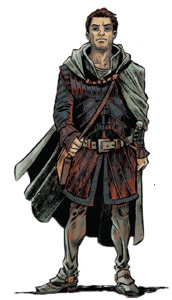When comics take the big screen

There are a handful of situations in life in which the adage 'you can't please everyone' applies, especially in the world of filmmaking. The act of taking a beloved comic series and transitioning it to the big screen is particularly fraught with difficulty and scorn.
This is a task that Conor McCreery and Anthony Del Col are tackling as they work on screenplays and storyboards for the film adaptation of their acclaimed 12-issue serial, Kill Shakespeare. Writing for comics is a feat on its own, but transforming a comic series into a film format is a Herculean undertaking. Realistically, is it possible to faithfully transition from a graphic novel to a studio film, or maintain the integrity of the message when it's brushed in different strokes?
Countless movies have chronicled superhero triumphs over cackling evil masterminds, to remarkably varied reception. Filmmakers obviously hold their projects with high esteem, but the truth is that in most cases, someone is upset: it's either the comic purists who feel as though the film doesn't live up to the book's standards, or the majority of the crowd is frustrated when the plot is only decipherable to super-fans.
Zack Snyder, director of 2004's Dawn Of The Dead, has found a niche making comic franchise films, but not without feeling the sting of such a paradox himself. After the runaway smash, 300, Snyder directed the 2009 epic Watchmen, faithfully reconstructing comic legend Alan Moore's mid- 1980s cult serial to remarkable accuracy — however the film left a lot of audiences feeling cold and confused.
Film Director and Producer Sam Raimi, the blood-horror legend, lost control of his Spiderman series after the second film, costing the film its credibility with outraged comic enthusiasts. Before Christopher Nolan took the reins early in the 2000s, the Batman franchise had been knocked from its Tim Burton-led neogothic mantle to a running joke less respected than the campy 1960s television series. There are more bad comic adaptations out there than there is space to list them here, and that's without dabbling into fan-made films.
So the problem is this: if you make a film to satisfy the stalwart readers and loyal followers, you're very likely going to alienate regular moviegoers, the vast majority of the viewing audience you're targeting; do the opposite and the small fraction of your target audience that can critically validate your effort scorns and berates you. In order to reconcile this paradox, numerous barriers must first be overcome.
One obstacle McCreery and Del Col have faced from the beginning is the pre-existing connection people have with the characters in their work. Readers develop a connection with what they read; there is a level of interpretation that comes with using one's imagination, and very often the connection between readers and comics in particular is similar to that of a film director and his masterpiece — if it isn't according to the script, it simply isn't right.
McCreery explained that as work on their screenplays continued, they've maintained their focus by being aware of the stigma that often befalls similar projects, and identifying potential obstacles early.
"Comics were never biff-bam-pow — that was the Batman TV show. The only thing that's ever been biff-bam-pow and really simplistic was that show, and it's because TV was an inherently less sophisticated medium then," he said. "So people have a notion of comics that's based on Batman the TV show, which as a comics writer makes you want to tear out your hair — you're judging my medium based on another medium altogether."
"Or a 'bad comic book movie,'" he continued. "People say, 'It's a bad comic book movie.' Well, you're right, it's a really bad movie that happened to be based on a comic book that I guarantee you if you'd read (it) you'd have found (the movie) more intriguing."
McCreery pointed out that most often, the details that make or break a film adaptation of comic work lie in distracting from the strength of the story; the characters themselves. In trimming down an epic story, it can be possible to cut out moments that reinforce the overall character of the film.
"I think that's the problem these days — sometimes comic book movies think you're more interested in Spider-man than Peter Parker ... you're more interested in Iron Man than Tony Stark. But you know what? If the movie is going to be any good, I need to be more interested in Tony Stark. Iron Man is a cipher. Iron Man doesn't really exist, it's Tony Stark."
"I was talking with Andy Belanger — the artist for Kill Shakespeare — and we were saying that. Spider-man movies are at their best when you're totally down for Peter Parker because Peter Parker is you; he's the awkward 15-yearold kid in school, then he's the 24 year old trying to get a good job. That's why you keep coming back to Spider-man: Peter Parker is endlessly compelling."
Which is where Kill Shakespeare has the advantage: built upon a preexisting world with familiar characters, their story has the luxury beginning where it is most effective, without the need for delving deeply into character development. There is no need to tell Hamlet's back-story or paint him in a particular light — the audience (both comic and theatre) may love or hate him as they please, their connections only make the character that much more real.
The future of Kill Shakespeare — at least, in motion picture form — remains to be seen, although it certainly seems as though McCreery and Del Col are making decided and informed steps to make it happen. In the meantime, McCreery and Del Col are working on interesting new stories and vehicles for the world of Kill Shakespeare, so the outlook is optimistic. Currently, Kill Shakespeare is available in two volumes in trade paperback in local comic shops or online from KillShakespeare.com.













